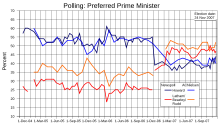|
Newspoll
Newspoll is an Australian opinion polling brand, published by The Australian and administered by Australian polling firm Pyxis Polling & Insights. Pyxis is founded by the team led by Dr Campbell White, who redesigned Newspoll's methodology as former APAC Head of Polling at YouGov from 2019-2023.[1] Newspoll has a long tradition of predicting Australian Federal Election results, both federal and state.[2] Until May 2015, Newspoll was a market research and polling company, part owned by News Corp Australia. In May 2015 administration of Newspoll was transferred to Galaxy Research. In December 2017, Galaxy Research was acquired by YouGov.[3] In August 2023, the contract to administer Newspoll was granted to Pyxis Polling & Insights. Newspoll's surveys of voting intention are published exclusively in The Australian. The poll is widely cited in other Australian and global media. Background and historyNewspoll was established in 1985 as a joint venture between News Limited and Yann Campbell Hoare Wheeler, which later was purchased by Millward Brown during the 1990s. In 2015 this company was wound up with The Australian announcing that henceforth Newspoll would become a polling brand administered by Galaxy. The transfer of operation to Galaxy came with a significant change in polling methods, from live telephone interviews to a mix of online and automated telephone interviews.[4] However, the wording of Newspoll questions remained the same.[5] In the first major test of this methodology, Newspoll conducted by Galaxy Research was the most accurate national published poll at the 2016 Australian Federal Election.[6] A further change occurred in November 2019, with YouGov switching to entirely online polling.[7] Since this change, Newspoll has been consistently accurate, being ranked as the top pollster at six out of seven elections since 2020 by respected Australian Psephologist Dr Kevin Bonham, including having the final 2PP within 1% of the actual results in the Federal, South Australian, Victorian and NSW state elections as well as - the first election conducted under Pyxis - the referendum on the Voice for Aboriginal and Torres Strait Islander Australians. [8] Prime minister polling  The lists below show the prime ministers with the highest and lowest career ratings. In many cases the highest and second-highest (etc.) or lowest and second-lowest (etc.) ratings are held by the same prime minister. Highest approval ratingKevin Rudd has the highest career-peak approval rating, with 71% (18–20 April 2008). Highest dissatisfied ratingPaul Keating has the highest recorded "dissatisfied" rating, with 75% (3–5 September 1993). Highest "Better Prime Minister" scoreUntil mid-1991, "Better Prime Minister" ratings were only surveyed during election campaigns. Kevin Rudd has the highest "Better Prime Minister" score, with 73% (28 Feb-2 Mar 2008 and 4–6 April 2008). Lowest "Better Prime Minister" scorePaul Keating has the lowest "Better Prime Minister" score, with 27% (20–22 August 1993). Opposition Leader pollingNote: The lists below show the Opposition Leaders with the highest and lowest career ratings. In many cases the highest and second-highest (etc.) or lowest and second-lowest (etc.) ratings are held by the same Opposition Leader. For instance, 14% is not the second-lowest "Better Prime Minister" score ever recorded, since Brendan Nelson recorded ten scores of below 14%. Highest approval ratingKevin Rudd has had the highest recorded approval rating, of 68% (16–18 February 2007 and 11–13 May 2007). Lowest approval ratingAlexander Downer recorded the lowest approval rating, of 20% (2–4 December 1994 and 16–18 December 1994). Highest dissatisfaction ratingAlexander Downer recorded the highest dissatisfaction rating, of 69% (2–4 December 1994). Highest "Better Prime Minister" scoreKevin Rudd holds the record with 50% (19–21 October 2007). Lowest "Better Prime Minister" scoreBrendan Nelson holds the record, with 7% (29 February-2 March 2008). See also
References
External links
|
||||||||||